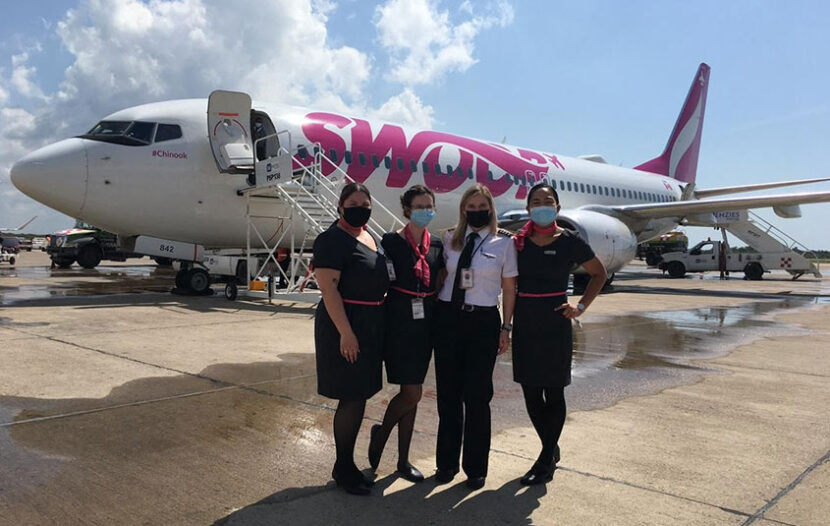Access selected deals available with budget and full-service airlines
Lock any airfare that sounds great. You don’t lose anything if you cancel it
Call us anytime for any assistance. We do not go into hibernation
Your personal and financial information stays secure with us
Swoop Airlines was a Canadian ultra-low-cost carrier (ULCC) based in Calgary, Alberta, and a wholly owned subsidiary of WestJet. Launched on September 27, 2017, and commencing flights on June 20, 2018, Swoop aimed to provide affordable air travel to budget-conscious Canadians, competing with carriers like Flair Airlines. Operating a fleet of Boeing 737-800s, it served 38 destinations across Canada, the United States, Mexico, and the Caribbean, focusing on point-to-point routes without connections. Known for its no-frills model, Swoop offered low base fares but charged for extras like baggage and Wi-Fi. Despite a strong start, carrying nearly 7 million passengers, the airline faced challenges with frequent delays, cancellations, and customer service issues, leading to its integration into WestJet’s mainline operations on October 28, 2023. Swoop’s legacy continues to influence WestJet’s low-cost offerings.

Swoop Airlines was established by WestJet in April 2017 to enter Canada’s growing ultra-low-cost carrier (ULCC) market and compete with NewLeaf (later Flair Airlines). Officially announced on September 27, 2017, Swoop launched operations on June 20, 2018, with its inaugural flight from Hamilton, Ontario, to Abbotsford, British Columbia. Headquartered in Calgary, Alberta, the airline adopted a low-cost model inspired by WestJet’s desire to “swoop” into the market with affordable fares. Initially planned for late 2017, the launch was delayed to June 2018 due to the adoption of a lower-cost booking system.
Swoop expanded rapidly, introducing U.S. routes in October 2018 to Las Vegas, Phoenix (Mesa), Tampa, Orlando (Sanford), and Fort Lauderdale, becoming Canada’s first ULCC to serve the U.S. By December 2018, it added Mexican and Caribbean destinations, including Puerto Vallarta, Cancún, Montego Bay, and Mazatlán, followed by Los Cabos in November 2019. In 2022, Swoop announced five new U.S. destinations—New York (JFK), Chicago (O’Hare), Los Angeles (Burbank), San Francisco, and Nashville—bringing its U.S. network to 11 airports. The airline also served 10 new Canadian destinations, reaching a peak of 33 airports by summer 2022.
Despite carrying nearly 7 million passengers by July 2023, Swoop faced operational challenges, including frequent cancellations due to weather and crew issues, and financial pressures from its ULCC model. On October 28, 2023, Swoop was fully integrated into WestJet’s mainline operations, with bases in Winnipeg, Edmonton, and Toronto closing shortly before. WestJet leveraged Swoop’s success in ancillary revenue to enhance its low-cost offerings across its 180-aircraft fleet, transitioning from Swoop’s 16-plane operation to a broader low-fare strategy.
Swoop operated a fleet of 10 Boeing 737-800s, each configured with 189 Economy Class seats in a high-density 3x3 layout. The aircraft, with an average age of approximately 12 years, featured a distinctive pink-and-white livery, with names like “Bob” or “OhCanada” displayed under the cockpit window. Each plane included USB ports and 110V AC power outlets at every seat, a rarity among ULCCs, but lacked seatback screens or larger seating options. Wi-Fi was available for purchase ($10 CAD per hour or less for 3 hours), though streaming services like Netflix were unsupported.
Sustainability efforts were limited due to Swoop’s low-cost focus, but the Boeing 737-800’s fuel efficiency supported lower emissions compared to older aircraft. WestJet’s integration of Swoop included plans to apply ULCC learnings to its narrow-body fleet, potentially enhancing fuel-efficient operations across a larger network. The airline’s point-to-point model minimized connecting flights, reducing operational complexity and environmental impact.